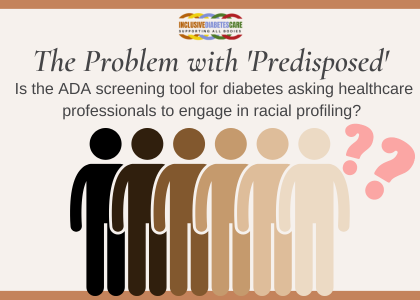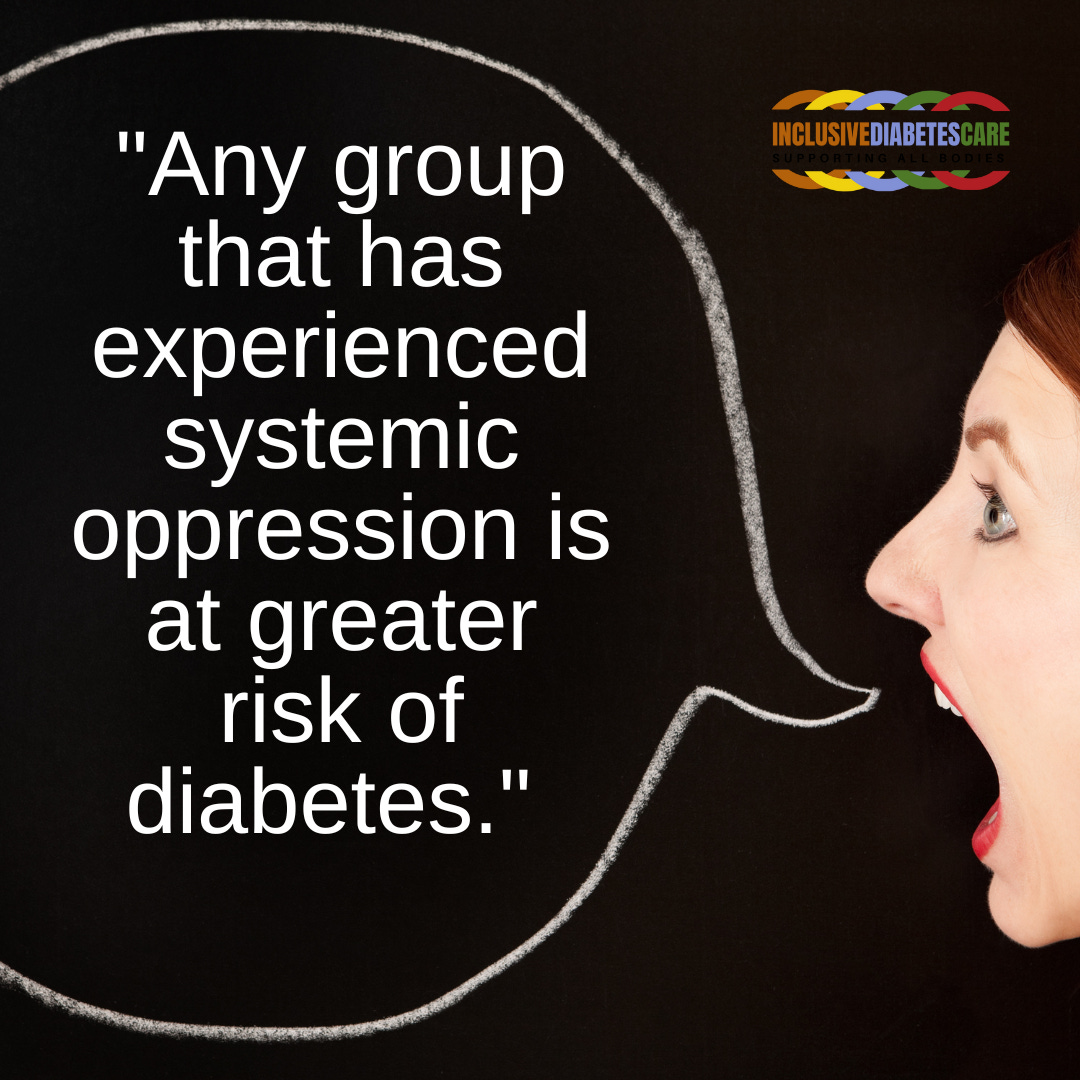The Problem with 'Predisposed'
Is the ADA screening tool for diabetes asking healthcare professionals to engage in racial profiling? This article explores the weakness of racial and weight-based risk factors in diabetes care.
What if not all risk factors are the same? The CDC offers the following list of risk factors for diabetes.
Having prediabetes.
BMI greater than 30
Older than 45 years or older.
There is a family history of diabetes, including parent, brother, or sister with type 2 diabetes.
Limited physical activity, less than three times a week.
Having gestational diabetes (diabetes during pregnancy) or giving birth to a baby who weighed over 9 pounds.
Or being an African American, Hispanic, Latino, American Indian, or Alaska Native person. The site also says. "Some Pacific Islanders and Asian American people are also at higher risk."
The problem with this screening tool is it singles out specific races. As a dietitian and DEI person, I continue to question why Black bodies would be 'predisposed' to health conditions like hypertension and heart disease. You and I both know race is a construct, so this question fueled me to dig deeper.
The research for ‘predisposed’ conditions points to historical oppression as the cause. The term is 'Weathering,' and in the fantastic book of the same title, Dr. Arline T. Geronimus documents the extraordinary impact stress has on health. Stress, you see, is something all my clients with diabetes talk about. What if there are different types of stress? I have cited the AMA 2021 article, Racism and Cardiology: A Global Call to Action, because it points to the impact of racial stress and explains, "The fact that minority groups tend to have a higher burden of cardiovascular disease risk factors is often a result of racist policies that restrict opportunities to live in healthy neighborhoods and have access to high-quality education and healthcare."
If you choose to keep reading, you will learn,"The mere perception that one is being discriminated against has been associated with a higher risk of high blood pressure,18 depression,19 and coronary artery stenoses 20 in Black individuals. An analysis from the third National Health and Nutrition Examination Survey found an association between the higher mortality incidence among Blacks and the higher "allostatic load" (i.e., wear and tear on the body resulting from stress) they experience.21 These factors could adversely impact the cardiovascular prognosis of Blacks in addition to that for Hispanics, Asians, and Native Americans in the US, even before they encounter the healthcare system. When racial bias awaits at the doctor's office or the hospital, the impact of racism on their health is compounded."1
Connecting the Dots
“The mere perception…” is a haunting phase. Pulling back, you can begin to piece together how oppressive healthcare begins by targeting ethnic groups. For example, the ADA says American Indians, Asian, Hispanic, and Black populations are at greater risk for diabetes. I am uncomfortable with singling out these racial groups because, speaking personally, I don't want to be racially profiling clients who come to care. Unfortunately, our current system of screening for diabetes unintentionally asks me to target specific people who are constantly being targeted.
Finding A Better Way.
I think this issue needs more discussion and input from everyone. Yet, I continue to believe if you changed this screening tool to say, "Any group that has experienced systemic oppression is at greater risk of diabetes." then we would have a clearer sense of the risk without blaming marginalized populations. This change would also allow us to address weight without amplifying weight stigma, which leads to weight cycling.
Weight cycling leads to many health concerns, including heart disease and diabetes. A 2021 research article explains, "In general, individuals with weight cycling had a significant 23% increased risk of developing diabetes." A 2017 article regarding heart disease found, "Many experimental studies support that weight cycling might cause fluctuations in cardiovascular risk factors, such as blood pressure, heart rate, sympathetic activity, and circulating levels of glucose, lipids, and insulin." Since diabetes and heart disease are connected, reducing all forms of oppression would benefit people with and at risk of diabetes.
Oppression, Not Race, Is Bad For Health
Oppression doesn't promote health, and risk screenings should consider how systemic oppression is a modifiable factor, where a person's race, weight, or sexual identity isn't. When research links a condition like diabetes with race, size, or gender, it becomes another justifiable reason to “other” specific groups of people.
I understand the desire to help, but I also know that this desire to do something quickly is part of White Supremacy Culture. I don’t want to support oppression, and I am old enough to realize that no amount of justification makes oppression okay. The problem is, because we exist in a system that is built on racial sorting, we don't know how to fix it….quickly.
The Second Truth
Like our political system, the healthcare system suffers from S.O.S., which Monica Guzman explains in her fantastic book, I Never Thought of It That Way, stands for Sorting, Othering, and Siloing. These three familiar actions create disconnection that has eroded the trust in healthcare. Medicine is grounded in the value of "Do No Harm," which, to me, has been diminished by capitalistic pressure. It is especially true in diabetes prevention, where rapid weight loss via extreme diets, exercise, or medication is assumed to be a better option than remaining the same weight and engaging in known health-promoting behaviors, like getting 7-9 hours of sleep, being physically active, managing stress by connecting with friends and family and enjoying hobbies (which can include cooking, eating and socializing with our friends and family!)
When any group is targeted as "At Risk," we unintentionally reinforce Othering. Many professionals have explained, "We must identify who is at risk!" This knee-jerk reaction is hard to resist. The key is identifying which BEHAVIORS and conditions create risk, not which PEOPLE.
Banerjee, S., Cader, F. A., Gulati, M., & Quinn Capers, I. (2021). Racism and Cardiology: A Global Call to Action. CJC Open, 3(12 Suppl), S165. https://doi.org/10.1016/j.cjco.2021.09.014




